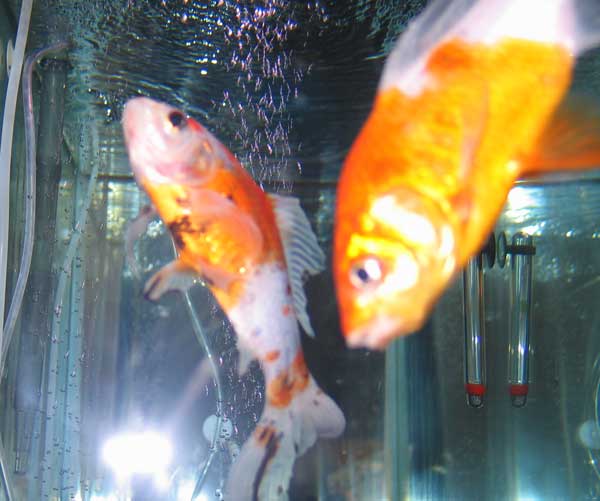Fasting Goldfish is not only cruel, but can upset their digestion
Fasting goldfish is a common practice in the goldfish industry. The theory is; less waste makes for fresher water; hence a healthier tank or pond, and there is also the idea that fasting prevents constipation, which is known to cause floating issues
Constipation in goldfish
Constipation is prevented by feeding a varied and healthy diet; feeding more often in lesser amounts, and feeding consistently. Fasting doesn’t prevent constipation, but may actually upset the delicate digestive system of the goldfish. In the wild, goldfish are constant grazers; if they’re not resting or spawning they’re hunting for food. Although constipation disrupts the exchange of gas from the intestinal tract to the swim bladder, an empty intestinal track can reek just as much havoc by not providing any gas at all, causing the fish to lose the ability to rise at will
Fasting goldfish may result in low nitrate production one day; high nitrate production the next, and even worse; a spike in the nitrogen cycle
Goldfish waste
Waste is seen as harmful by most goldfish keepers, but quite the opposite is true. The waste your goldfish produce is what encourages a healthy ecosystem; and this is accomplished by encouraging the production of beneficial bacteria, or what we call; friendly bugs. Think of goldfish pooh as food for your friendly bugs. Think of friendly bug pooh as nitrates
Feed a varied diet of vegetables and proteins; feed on a schedule; four to five times a day so the friendly bugs in your tank or pond will produce small amounts of nitrates consistently. This consistent production of nitrates allows for a consistent parameter or reading for nitrates
Step 10: Goldfish Feeding
Spikes in the cycle
Friendly bugs are delicate and just like goldfish, they are constant grazers. Even if fasting didn’t harm the goldfish; some if not all of your beneficial bacteria may be lost in the fasting process; even if the fast is only for a short time
Goldfish waste that has been utilized by friendly bugs doesn’t increase nitrate levels, but if your tank or pond doesn’t have enough surface action; this waste can and will become a food source for harmful bacteria
If you test your nitrate levels before each weekly water change, the test result will tell you if you should be feeding a little less, and or changing out a little more water or perhaps increasing the tank or pond size Test H20 Parameters

The fish in the photo above suffer from a multitude of issues, however, malnutrition is prevalent. Unknowingly, the fish owner withholds food for days at a time, in order to prevent a spike in the cycle, inadvertently causing one. The water is low in oxygen, the cycle is broken and the fish are dying from starvation
Fasting goldfish
Goldfish are more susceptible to nitrates in water at warmer temperatures. When the thermostat climbs, increase number of water changes and chill the tank water
Fasting our goldfish is cruel and causes serious digestive issues that lead to floating issues that can lead to death
If your goldfish is refusing food; there’s a good chance it has been effected by nitrates. Goldfish eat on instinct, and most fish will eat even if they are sick from bad bacteria or even if they’re impacted because of constipation. Unless a fish is very sick and dying, nitrate poisoning is the only thing that will stop it from eating
All rights reserved
Author: Brenda Rand